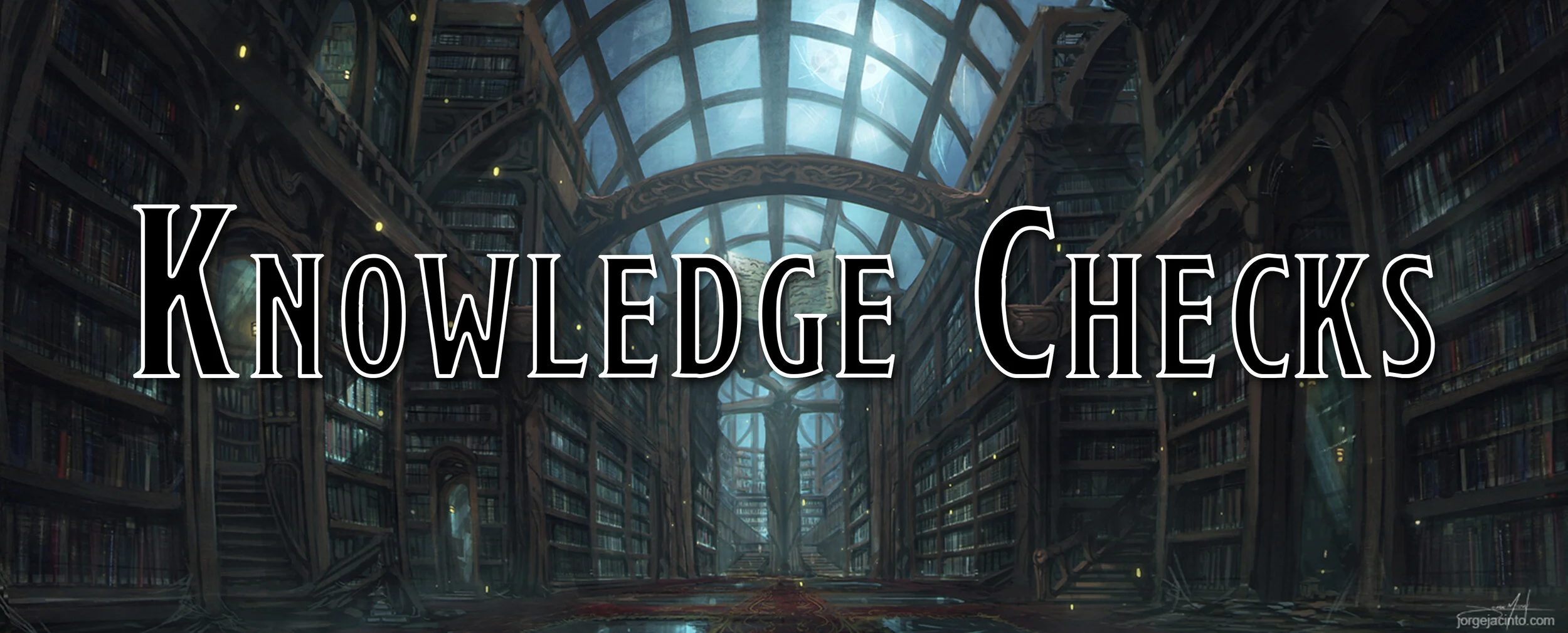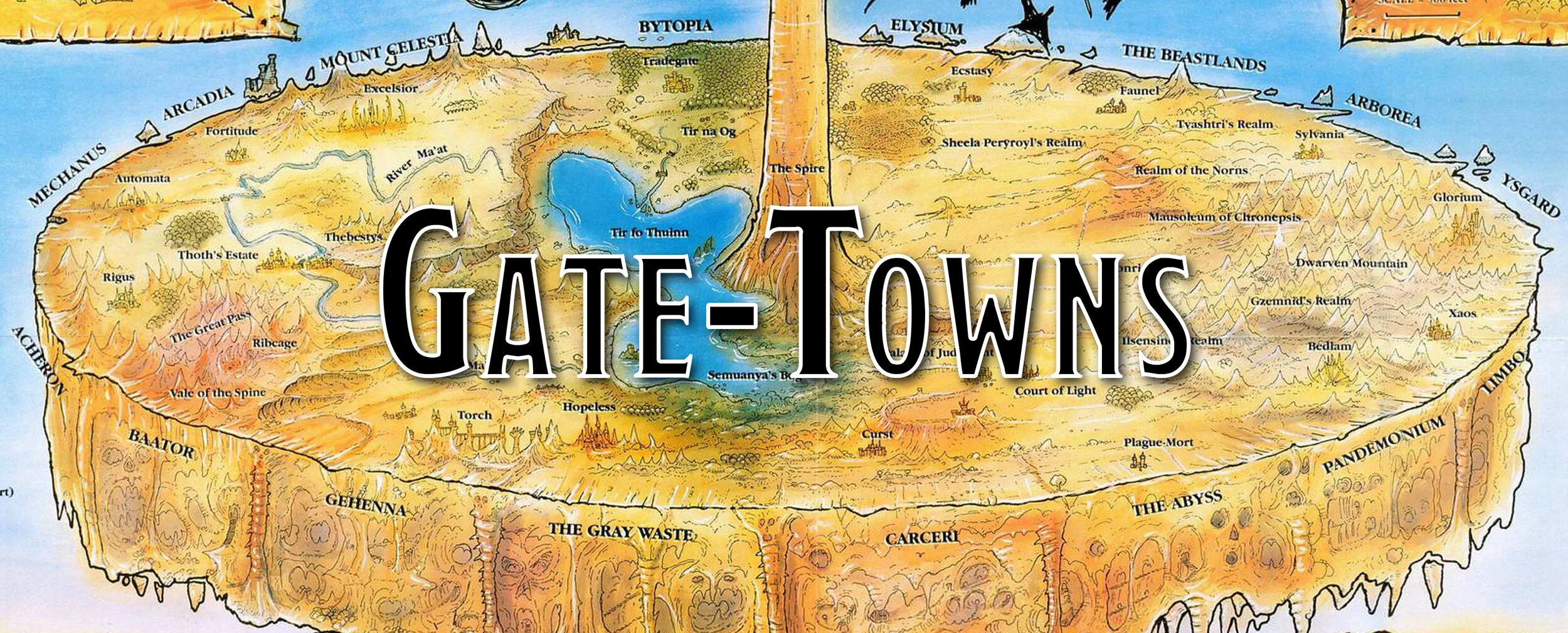Homebrew - Knowledge Checks
Even though, by our very name, we love a good dump stat - I always hate it when a player treats intelligence as a dump stat. Part of that is to be blamed simply because there is only one class, in D&D 5e that is, that truly values intelligence and everyone else just rolls their eye. But this is true in a few other games I’ve played or ran. Intelligence gets ignored or downplayed, treated as a spellcasting stat, and largely ignored by the players if they aren’t casting spells. Sure, intelligence isn’t as sexy as a good dexterity score since that helps define a huge amount of your character in a wide variety of game systems out there, but it has its importance.
This week I’m looking at the Intelligence ability score in Dungeons & Dragons and how it can be used in your games to help give players an edge.
For best results in GM Binder, use a Chrome Browser
Knowledge Checks
These checks are meant to be used in combat, though could just as easily be done before combat is rolled and blood starts pumping. This small system uses the three Intelligence-based skills dealing with a creature’s knowledge of the world they reside in; Arcana, Nature, and Religion. A character, if they have gotten a chance to see or hear a description of the creature, can make one of the appropriate skill checks to see what they know about a creature as well as getting a few pieces of information about them.
These types of checks were quite common in Dungeons & Dragons 3rd edition as well as in 4th edition, so it’s a shame to see them not return in 5th edition. In fact, 3rd edition had a few more knowledge checks like dungeoneering, local, and one specific for the planes. Dungeoneering was great if you wanted to know about oozes or how to spelunk, while local was all about local gossip and humanoids, and then there were the planes… which was all about the planes and the monsters from those regions.
The System
This is quite simple and requires very little to memorize. The player rolls one of three skills: Arcana, Nature, or Religion as determined by the DM. The DM determines the skill-based on what creature the character is inquiring about.
Once the character announces their result, the DM then compares the CR of the creature against the roll. For the barest of information, the DC for the check is 10 + half the creature’s CR. On a success, the DM can provide some information and one piece of Useful Information.
That’s the basics. Let’s get into it a bit more.
Intelligence Checks and Creature Types
A creature’s type is going to determine what roll Intelligence-based skill is going to be rolled for information. My assumptions are below, but as the DM, you are free to change as you see fit.
Arcana / Aberration, Construct, Dragon, Elemental
Nature / Beast, Fey, Giant, Humanoid, Monstrosity, Plant
Religion / Celestial, Fiend, Ooze, Undead
There are a few that could be argued one way or another, as there are cults devoted to aberrations, but that is always going to be a DM’s call. Maybe they’ll allow a cleric to roll religion to determine information about a Star Spawn, then again maybe a ranger might ask if the check could be nature if they are fighting an elemental from the Inner Planes, the planes that influence the nature they so love.
Difficulty & Useful Things
Once the DM determines what skill to be rolled, the player goes ahead and does so, adding their adjustments to a d20. Once the player announces their result, it is now up to the DM to decide how much information the character should receive. The basic DCs are:
1 Useful Thing / 10 + half the creature’s CR
2 Useful Things / 10 + the creature’s CR
Additional Useful Things / For every 5 above the 10 + the creature’s CR a character gets, they get another piece of useful information
It’s fast and easy math doesn’t require too much brainpower to throw out there.
For example, let’s say Belac the Mighty and Unkillable is fighting a dire spider filled with horrible poisons that could kill a lesser man. Belac is pretty confident in his ability to crush the spider but wants to make sure that muscles are the best way to squish a spider. The player for Belac asks if they know anything about the creature and the DM asks for a Nature check.
Belac rolls a d20 and adds his Nature proficiency to the roll for a total of a 15. The DM then determines how much information Belac gets. The dire spider is only a CR 2 creature, so 10 + the creature’s CR of 2 would be a DC of 12 to get 2 useful pieces of information. Unfortunately, Belac did not roll high enough to get a third piece of information, which would be a 17.
The DM then gives Belac two pieces of useful information to help Belac fight the spider. The DM could decide what information Belac gets, could ask if there is something specific Belac is looking for or could pick 1 thing and let Belac pick something else.
This useful information should actually be useful in combat and could include a huge amount of different things. That information could be one of the following, or anything else they deem is appropriate.
Creature Type
Number of Hit Dice
Type of Hit Dice
Best/Worst Saving Throw
Skills
1 Weakness (if any)
1 Resistance (if any)
1 Immunity (if any)
Special Senses
Special Abilities
Special Attacks
Number of Attacks
Attack Damage Type
Special Monsters
Now, this system is perfectly fine for common monsters, the ones with folktales, and books written about them. But some monsters are going to be quite rare in different worlds. Maybe demons have been extinct from a world for eons, and suddenly they have returned bringing with them destruction. There might be ancient tomes written of them, but only the most scholarly would have ever looked at them. The DM may require only creatures who are proficient in a specific skill could attempt the roll.
Then again, maybe this is a singular being. A creature so unique that none have ever trampled the world down before. In this case, it would be perfectly logical that no one has heard anything useful about this creature and no check can be made. This is all dependent on the world, the DM’s discretion, and the type of monster threatening an adventurer’s very existence.
Characters and Knowledge
This is all meant to show that characters are going to know more about the world they live in, than the players who only play in it. Characters live in a world of actual monsters and horrors, it makes plenty of sense that they have researched the monsters, heard tales about the weaknesses of them, or that there is a set of common knowledge about the more prevalent monsters and their abilities.
Metagaming
Of course, such checks are bound to bring up the concept of metagaming. I get it, I’ve had a player at an Adventurer’s League that would constantly sneak his Monster Manual out while I wasn’t looking to look up monsters, or would bring out his phone and start looking at stats. It’s annoying.
But sometimes, player knowledge can be considered character knowledge. If a player already knows that trolls are weak to fire, it's probably fine to just make it so that the character already knows that. Again, they live in a world of monsters, they’ve probably heard all the common stories too.
Concluding our Knowledge Check
While that isn’t everything, as there are a few variant rules I offered in the system, that is the basics. I use this all the time with my players, giving them information on the monsters they fight, which forces them to adjust their tactics. Not every monster can be destroyed by crushing it with a sword, sometimes ice or fire or force is the only way to bring down a monster.
If you want a printer-friendly PDF of this homebrew, or any other homebrew or tool we’ve made, consider supporting us on our patreon! All hombrew that I’ve created or will create in the future will be uploaded to our patreon in printer-friendly versions. We appreciate any and all support!
Like what we are doing here?
Support us on Patreon!
You’ll get early access to deep dives, our Homebrew Hoard, and more!
Follow us on Twitter to keep up to date on everything we talk about!



